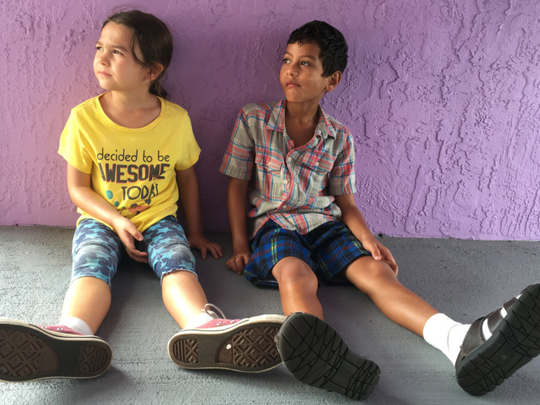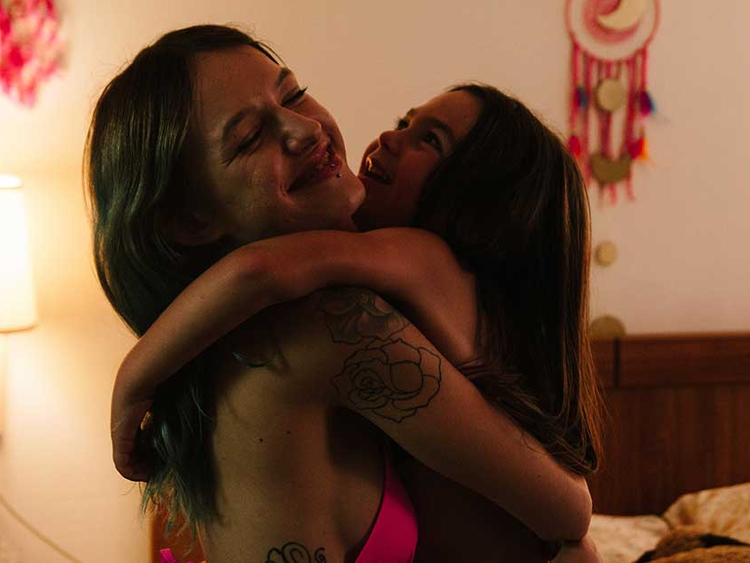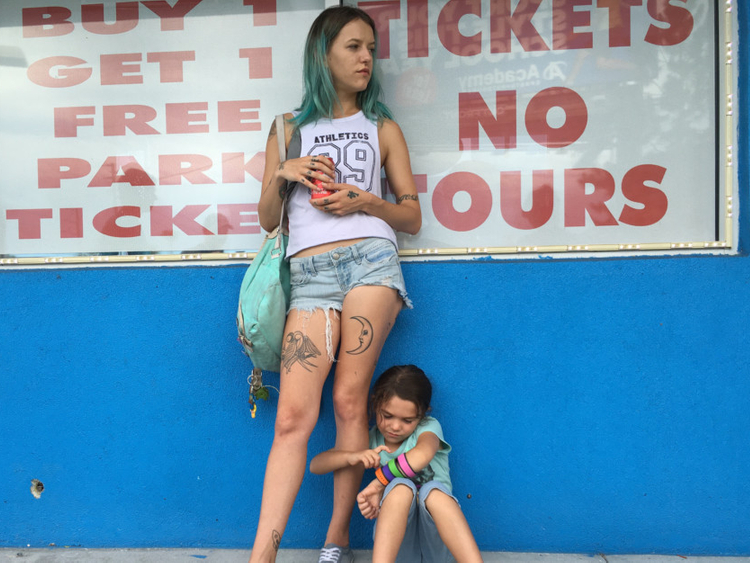
Moonee is six. She lives in the shadow of Disney World, in a stretch of Central Florida dominated by cheap thrills and off-brand amusements. Home is a room in a motel called the Magic Castle, one of many garishly painted stucco-clad palaces whose names represent either false advertising, honest aspiration or brutal irony. This is an unmagical kingdom, a zone of tawdriness and transience, of strip clubs and strip malls, knock-off souvenir shops and soft-serve ice cream shacks.
But for Moonee (who is played by an uncannily poised and resourceful young actress named Brooklynn Prince), the Magic Castle and its surroundings are a land of endless enchantment and non-stop adventure. Mischievous and fearless — heroically bratty, devilishly cute — Moonee may remind you of Eloise, who tries the patience of the grown-ups at the Plaza Hotel in that immortal picture book. Their situations are different, of course. Moonee’s mother, Halley (Bria Vinaite), is not jetting around Europe leaving her daughter in the care of a stressed-out nanny. She’s very much a presence in Moonee’s life, perhaps more big-sisterly than maternal, but doing whatever she can to keep them housed, clothed, fed and entertained.
What Eloise shares with The Florida Project, Sean Baker’s risky and revelatory new film, is the ability to tell its young heroine’s story from two perspectives at once. Moonee’s free-range existence looks like a lot of fun, and she and her friends — mostly a boy named Scooty (Christopher Rivera) and sometimes a girl named Jancey (Valeria Cotto) — run wild with an exuberance that adult viewers can only envy. Moonee and Scooty are like Huck Finn and Tom Sawyer; the service road is their Mississippi River. They cook up pranks and follow their whims, heedless of the consequences. But of course the viewer who experiences vicarious delight in their capers — ice cream tastes so much sweeter when you have conned some tourists into paying for it — is simultaneously conscious of an undertow of sorrow, anxiety and dread. We are well aware of the possible consequences, and also of the grim circumstances that grant Moonee her freedom. She is in every sense a child at risk. We watch her Little Rascal antics increasingly sure that something terrible is going to happen.
To balance joy and desperation as gracefully as Baker does — to interweave giddiness and heartbreak — is no easy feat. The Florida Project could easily have been cruel and exploitative, punishing its characters for their wildness and the audience for enjoying it. But the director, who wrote the script with Chris Bergoch, avoids the traps of condescension and prurience that ensnare too many well-meaning movies about poverty in America. Like Barker’s earlier features Starlet and Tangerine, this movie insists on meeting people on both sides of the screen where they are, on suspending judgement and extending compassion without abandoning its ethical grounding. Tangerine, an against-the-clock chronicle of a hectic day in the lives of two transgender hustlers in Los Angeles, won some of its fame for having been shot with an iPhone camera. The Florida Project has a more polished look, but the bright colours and rough, warm edges of Alexis Zabé’s cinematography fit the mood and the setting. You see traces of the near-tropical natural glory that drew generations of hedonists, fortune hunters and entrepreneurs to this part of the Sunshine State. You also find some beauty in the blight they brought with them. Halley and the other parents and grandparents trying to raise children in the motels are part of that history, chasing dreams that seem at once fanciful and mundane: celebrity, wealth, a steady job, a stable home. All of these things seem equally out of reach and tantalisingly close at hand, and the same consumer economy that creates such precariousness also provides a steady stream of pleasure and diversion.
The steadiest adult presence in Moonee’s world is Bobby (Willem Dafoe, never better), who runs (but does not own) the Magic Castle. You get the feeling that Bobby didn’t exactly sign up to be the de facto mayor of a makeshift village, but he also clearly finds some satisfaction in managing the disorder that surrounds him. He’s gentle with the children even when they drive him crazy and disrupt his work, and watches over them when nobody is looking. (In one of the film’s most gripping and sharply constructed scenes, Bobby confronts a creepy, predatory interloper who has been hanging around the motel’s playground.) His observant, unassuming decency makes him, to some degree, the filmmaker’s surrogate. The Florida Project is honest about the limits of benevolence, and about the wishful thinking that can cloud our understanding of the world.
Its final scenes are devastating, and also marvellously ambiguous, full of wonder, fury and clear-eyed self-criticism. No magic exists that can make the pain of reality disappear, but we don’t know how to believe in anything else. This movie accomplishes something almost miraculous — two things, actually. It casts a spell and tells the truth. ___
Don’t miss it The Florida Project releases in the UAE on January 25.











